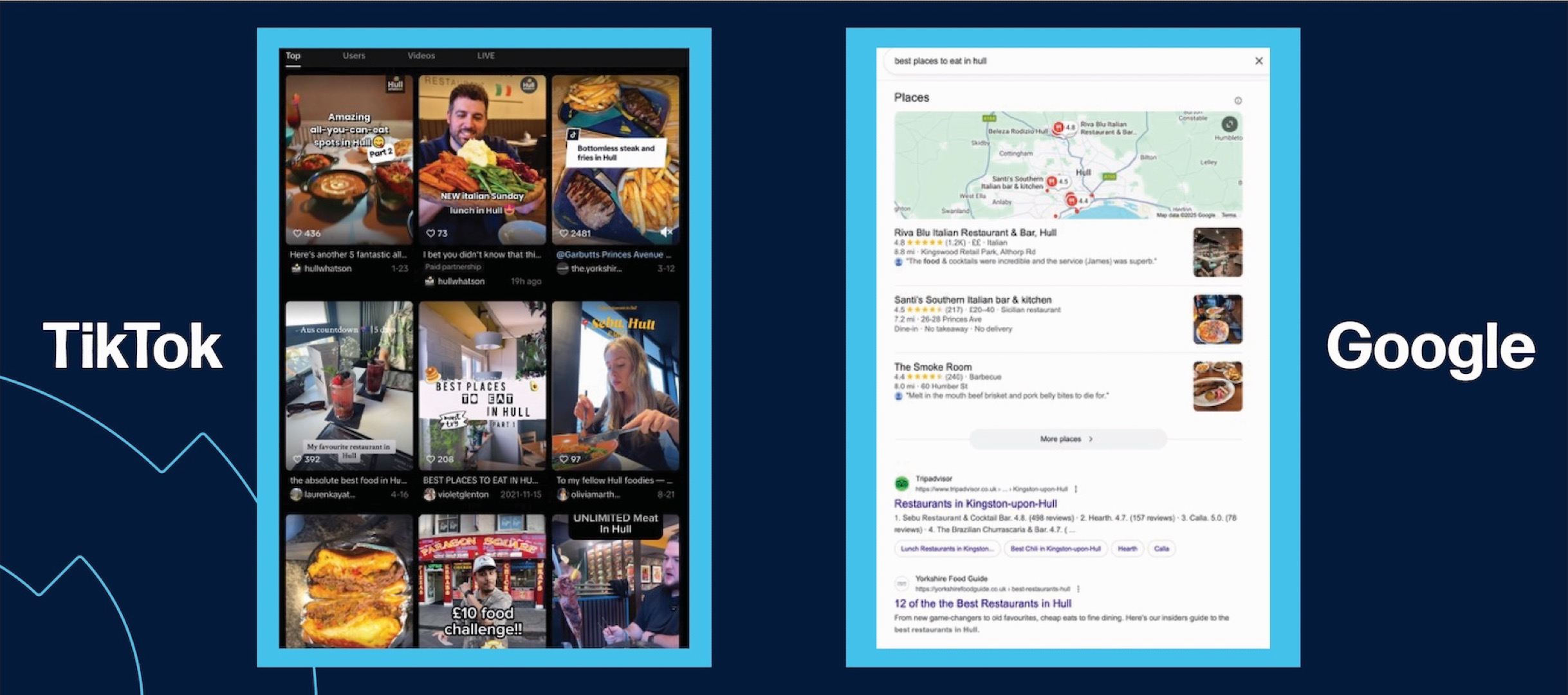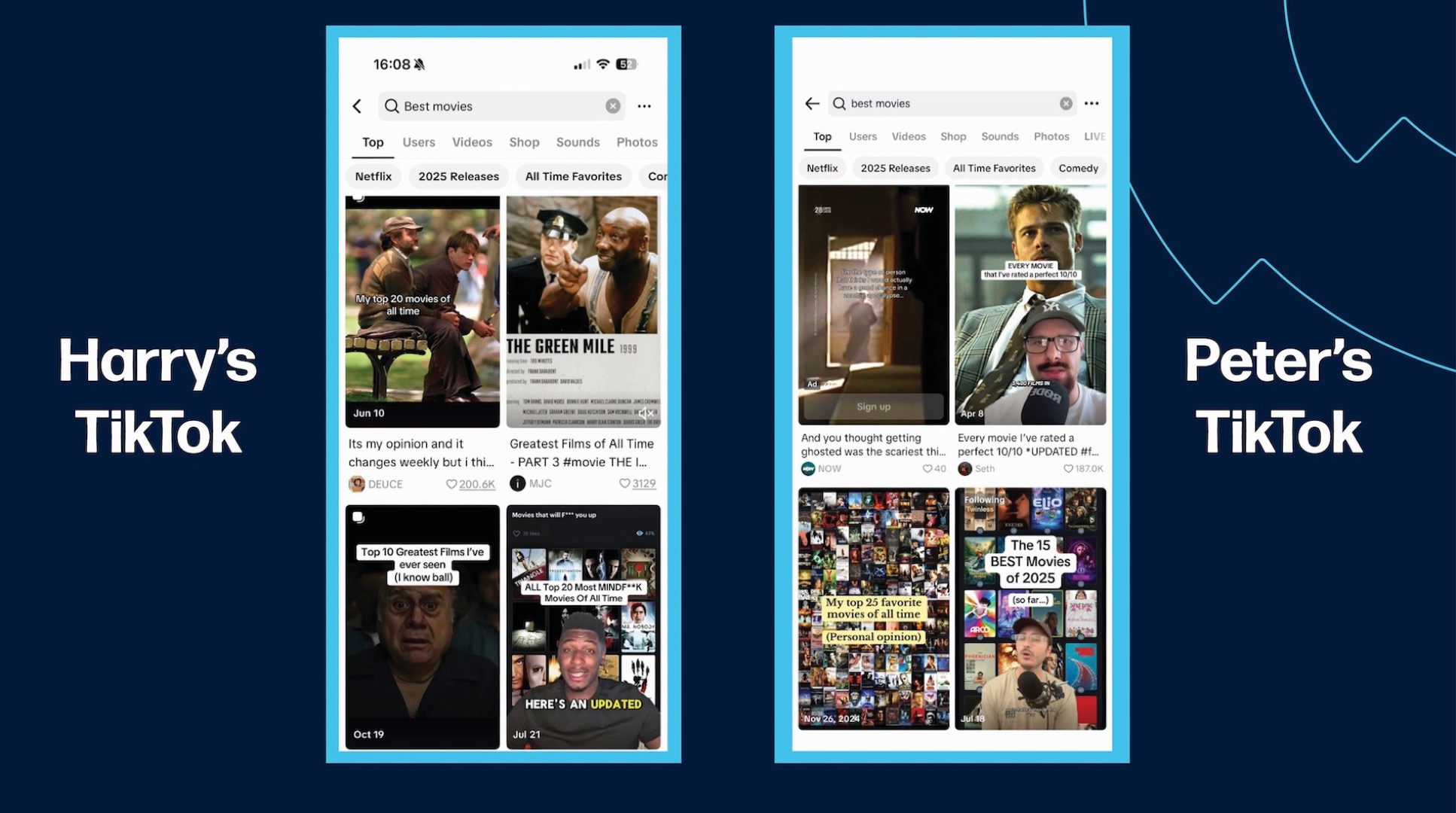9 minutes
In the new era of social media and search, 63% of Gen Z use TikTok as a search engine for the latest news and 77% use TikTok for product discovery (Metricool).
With these users also spending almost 50 hours per month on the app, it means TikTok has become a powerful discovery tool – one that’s reshaping how people find information online.
As we’ve discussed in our GEO blog, Google is losing ground to new behaviours such as AI and the reinvention of social media as a search engine, with TikTok quickly becoming the go-to for younger audiences.
But what does this mean for your business? This blog explores the evolution of TikTok search, what makes it unique and some Bluestorm tips on how to optimise your brand for awareness and conversions on the platform.
The rise of TikTok as a search engine
Before we delve into TikTok search, let’s take a trip down memory lane to when the renegade trend filled the ‘For You Page’ and every other video was an LA influencer dancing their socks off.
TikTok was originally created as a platform to share short-form mobile content focusing on music, lip-syncing and entertainment (BBC), later merging with another social media app, Musical.ly.
So how did TikTok, a jovial video content app, become a pioneer of social media as a search engine? As TikTok rose to fame, users started creating all sorts of content. From comedy sketches to reputable news videos, TikTok became a place for everything. With this varying content, TikTok had to grow as a platform and accept its change.
In December 2024, TikTok’s ‘Search Era’ was born, transforming it into a discovery engine. This new era brought a huge algorithm change which prioritised search compatibility and keyword optimisation (Napolify).
It was the proof that TikTok understood its assignment. It was no longer just a ‘get viral quick’ social media, it became a competitor in the search world.
What makes TikTok search different?
We’ve seen companies try to rival Google before and fail, so why and how has TikTok become a genuine competitor? The difference is that TikTok search has never tried to be like Google; it’s stayed true to its roots of short-form video content. In doing so, it’s become a unique search engine built for Gen Zs. The main difference making factors are:
1. Real people, real experiences vs SEO optimised content
TikTok shows users what they want in video form rather than as website links. In the modern era of visual learning, Gen Zs prefer to learn about a given subject through video content rather than searching for a website to tell them more.
Video content connects real people and experiences with their search. For example, take a look below at the differences if I search for ‘Best places to eat in Hull’ on TikTok and Google.
TikTok is showing me real people visiting the ‘Best food spots in Hull’ and providing genuine reviews on whether it’s good, whereas Google is showing me the names of restaurants and Tripadvisor. People resonate easier with the content that TikTok is providing.

2. Personalised algorithm and the ‘For You’ format
TikTok as a search engine has a huge benefit to users with its personalised algorithm, which appears to learn what its users want far quicker than other apps. The TikTok algorithm shows a user content that they are most likely to interact with and it’s a deciding factor on what TikTok search feeds a user.
We put this to the test in the Bluestorm office. My colleague Harry (Digital Marketing Executive) and I (Peter, SEO & Digital Product Consultant) tested a TikTok search on our personal accounts. We both searched ‘best movies’ and these were our results:

As you can see, we both received vastly different results – even though there was no difference in what we searched for. But our results are personalised to creators we have each interacted with before or aligned to what TikTok knows we are interested in.
3. Trending information
Video content can now be produced and uploaded to TikTok within minutes, far quicker than it can be on traditional search engines. That’s great for trending information and breaking news, which TikTok then serves to people on their ‘For You Page’, piquing interest and encouraging them to use TikTok as a search engine to explore the trend further.
What are people searching for on TikTok?
We know that Gen Zs are using TikTok as a search engine, but what are they actually searching for? With a wide variety of content and people vlogging and posting about a range of topics, TikTok has become a search tool for many things but mostly for opinion based points such as ‘best X’. The top things people use TikTok search for are:
Product reviews and recommendations
Local business discoveries (restaurants, cafés, venues, activities etc)
How-to tutorials and educational content
Travel and lifestyle inspiration
TikTok search implications for businesses
With the new opportunities that using social media as a search engine brings, it’s important for your business to be discoverable. Building up a social media presence is essential to increase your authority and content value. TikTok search, similarly to Google, bares in mind your page authority when showing search results.
Whilst building authority, your posts should be aligned and optimised to keep the same messaging style present throughout.
Our TikTok search optimisation tips
TikTok is different to Google and other search engines you optimise for. Here’s a few tips from Bluestorm on how to optimise for TikTok search…
1. Use keywords in captions, hashtags and voiceovers
TikTok looks at three aspects when searching for keywords: captions, hashtags and voiceovers. Ensure your messaging in captions is similar to the messaging in voiceovers and in your video because TikTok will listen to your video to pick up keywords.
2. Create searchable content
As much as your content should be entertaining, it should also have a search purpose. Is the content answering a question? Or giving more information on a current topic? Think about what the video wants to answer and ensure the content stays relevant and hits the keywords surrounding your question.
3. Optimise your profile for discoverability
Ensure your profile settings are all in place and aligned. Your Username and Profile name should be as close to each other as possible. For example, ‘Bluestorm Marketing’ as the profile name and the username as ‘Bluestorm.Marketing’. You should add key information into your bio which describes your business in 1-2 sentences. Having a link to your website is also a great addition to the bio.
4. Engage with trending topics strategically
Trends appear on TikTok every other day, but this doesn’t mean you should hop on every trend to try and go viral. Trends should be picked strategically and fit into your business’ image and style.
Let’s say you’re a women’s fashion company. Two of the big trends in 2025 were the 6-7 meme and the surge in popularity of Stanley cups. The first wouldn’t align with your brand’s messaging and style, but the Stanley cups trend would.
This would be a great opportunity to lean into the trend and promote your brand’s clothing on TikTok. You could take it a step further by also targeting Google and your website too. Create a blog post titled ‘Styling with a Stanley Cup: Top 10 outfits that match the Stanley Cup vibe’ and you’re now leveraging the trend to bring more traffic to your site – the place where people are most likely to convert to customers.
The key takeaway
The way that people are searching for information is changing. With the rise of TikTok as a search engine for Gen Zs, it’s important for businesses to start optimising TikTok and social media content to reach a larger audience.
But that’s not to say the traditional methods are dead. Google is still the biggest player in the search world and the rise of people using AI tools to search for information adds another piece to the puzzle.
That means it’s time to call in the experts. Our team at Bluestorm can help you optimise your content for different search engines and connect the dots in where your potential customers could be searching. Contact us today and let’s have a chat about your needs.
